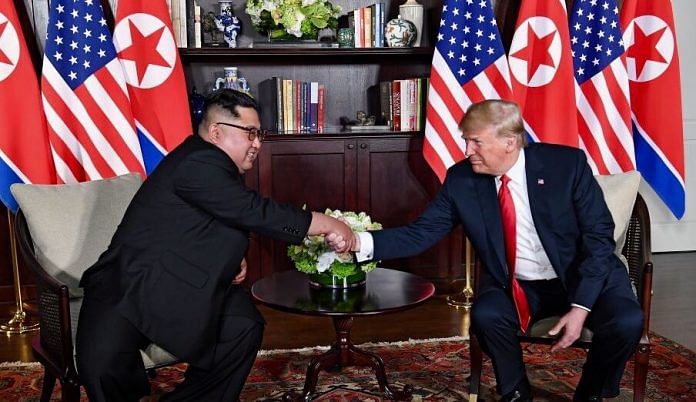Future diplomatic goals could be accommodating North Korea as a nuclear power, convincing it to halt further testing, and lifting of sanctions.
When Donald Trump and Kim Jong-un shook hands, history was made. Any serious observer of global affairs and of North Korea’s recent nuclear developments would not fathom that this was possible. It has been tried before, but never did we reach even remotely close to North Korea’s dictator holding a bilateral summit with the American president. But make no mistake, this was the moment North Korea’s top leadership has wanted for decades.
Comparisons are being drawn between Trump’s rather outrageous G7 outing and his relatively warm meeting with his “little rocket man”. Partisans will compare this Trump-Kim summit with older historic summits such as that of Richard Nixon-Mao Zedong and Ronald Reagan- Mikhail Gorbachev.
North Korea remains one of the only four remaining communist states today. Moreover, it continues to be totalitarian of the 1930s variety. Since the beginning of the Korean War in 1950s, the global community has shunned North Korea. Sanctions and embargoes were placed. The state adopted a harsh form of autarky. More sanctions were put in place. And, North Korea became all the more inward-looking. Once in a while carrots were thrown, and when they wouldn’t work, sticks replaced them. Multiple diplomatic forums were set up to negotiate with North Korea, but they all ended without a breakthrough.
Unfortunately, none of the tools used by the West over past six decades have worked. The United States has successively failed to convince North Korea to give up its totalitarian means. So, what exactly changed in 2018 that has brought North Korea to the table?
Was this Trump’s ‘Nixon goes to China’ moment? Over the last year, the Trump administration adopted a maximum pressure strategy with respect to North Korea. His foreign policy, driven chiefly by military generals, and his tweets took a hawkish position. The understanding was that no amount of carrots could discourage North Korea from building a nuclear capability. The United States convinced China to adopt far harsher sanctions on North Korea.
On the other side, since Kim took charge, North Koreans had been on an ICBM and nuclear-testing spree. The rate of missile tests shot up over the past five years. While Kim worked with his nuclear experts day-in-and-out to develop a nuclear capability, he ensured that all his domestic political rivals were assassinated.
Towards the end of the last summer, Kim’s regime had achieved their goal. They had successfully detonated a thermonuclear bomb. Unofficially, North Korea was the ninth nuclear state. It was this major nuclear breakthrough that eventually drove Kim to the table. And, allowed him to have a bilateral summit with the much-esteemed American president.
It was interesting that after that successful detonation, North Korea’s testing spree was abruptly halted. Contrary to American fears, North Korea’s nuclear deterrence goal was not to reach the American western coast. North Korea’s neighbours include major American allies, Japan and South Korea. And Kim’s regime had achieved the ability to strike them. As of now, it has no interest in developing the ability to strike the American mainland.
As political scientist and nuclear expert at MIT, Vipin Narang, tweeted – with the Kim-Trump handshake in Singapore – North Korea’s nuclear deterrence was complete.
Nuclear deterrence rests on chiefly three factors – capability, credibility, and communication. North Korea’s proficient propaganda department ensured that the news about state’s nuclear capability reached every corner of the world. And with the Kim-Trump summit, not only was a brutal North Korean dictator legitimised, but so was his nuclear programme.
The joint declaration signed by Trump and Kim talks of denuclearisation of the Korean peninsula, the US’ security guarantees to North Korea, and establishment of diplomatic relations between the two states.
It is important to remember here that North Korea has made such commitments regarding giving up its nuclear programmes in the past as well. Furthermore, given the political capital Kim has invested in his nuclear programme and its explicit link to regime stability, it is highly unlikely to see North Korea giving up its nuclear weapons.
Given the US’ position in the international system and its previous record on non-proliferation, it would not recognise North Korea as a nuclear state easily. But taking into account that the American president agreed to meet Kim only after he had successfully detonated the N-bomb, there is every bit of soft signalling that North Koreans want.
Beyond the media frenzy today, where the North Korea-United States relationship goes will be determined over a longer period. Future diplomatic goals could be accommodating North Korea as a nuclear power and accepting its nuclear deterrence, convincing it to halt further testing, and the lifting of sanctions. But these would require months, if not years, of serious bottom-up diplomatic negotiations.
As political scientist at McGill University, Juan Wang points out – for North Korea, the US is the beginning and the end of its diplomatic purpose. The North-South Korea or even the China-North Korea relations are relatively inconsequential. With the Trump-Kim handshake Tuesday, North Korea succeeded in achieving its decades-old foreign policy objective.
Srijan Shukla is a student of comparative politics and international relations at McGill University.




North Korea has committed itself to “ complete denuclearisation “. That leaves no scope for America to recognise it, even informally, as a nuclear power. Capabilities developed at high cost, exacerbated by crippling sanctions, will have to be neutralised or surrendered, subject to verification and safeguards, including from the IAEA. No sovereign nation has gone so far in the past. It is now for America, its allies, and also China to start the process of dismantling sanctions and offering North Korea substantial economic benefits. It remains the only impoverished nation in East Asia. It people deserve to see an improvement in their living standards.